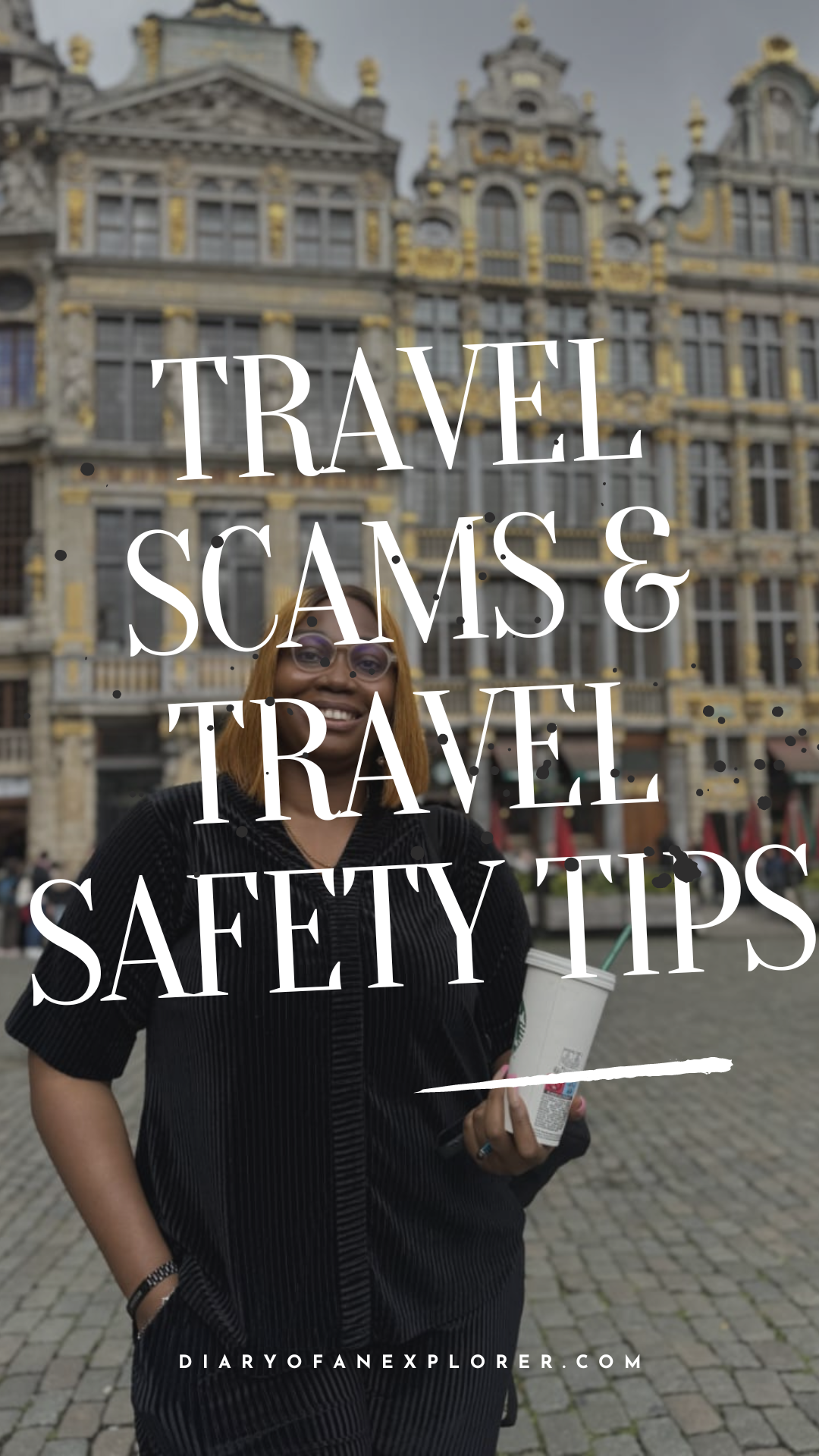One can never be too careful and in terms of traveling to an unfamiliar place you need to be on your guard to avoid falling for scams. As a traveller, either newbie or seasoned, you can fall prey to thieves, scams and pickpockets as travellers are often seen as easy targets. It doesn't mean you're naive or trusting as the scam artists in different destinations get craftier with their skills.
Travelling is an exciting experience everyone should try in their lifetime but there are risks. Aside from minor inconveniences in a change of plans and emergencies, the risks include falling victim to scams that would cause emotional distress and financial loss.
No one ever wants to experience such scams, thus important to stay vigilant, do your research and be aware of possible travel scams that you might be subjected to and helpful tips to avoid them. Being cautious goes a long way and to help you stay ahead of travel scams, here are some common travel scams and safety tips to avoid them.
Common Types of Travel Scams
1. Taxi Scams
Overcharging
One of the most common travel scams involves taxi drivers overcharging passengers. Coming from someone who has been in such a situation, taxi drivers overcharging in a foreign country is unpleasant. The drivers do this by either tampering with the meter (because you're a tourist), claiming the meter is broken, or taking unnecessarily long routes to increase the fare. These types of drivers are commonly found around the airport or tourist areas. This can happen through various means, such as tampering with the meter or taking unnecessarily long routes to increase the fare.
There is also the possibility of falling prey to unlicensed or fake taxi services operating in some destinations. These taxis might overcharge, dupe, or be involved in criminal activities that would put you at risk so before hailing a taxi service. Verify the taxi operating service is authorized and ask the taxi driver to put on the meter immediately after the trip starts to avoid being overcharged.
Be aware of red flags like the taxi driver offering to take you to a different location from your planned one due to the hotel being overbooked or closed, or offering a better location. This is a major safety concern and should not be overlooked.
It is very easy for tourists to fall for these scams especially if it's an area you're unfamiliar with or if you do not speak the language. To avoid such situations, learning a few phrases in the official language to communicate your destination might help and also have a GPS like Google Maps, to understand the route and monitor your journey. For situations like poor internet services, you should download the maps to your destination before you arrive.
2. Accommodation Scams
One of the most common accommodation scams is fake listings on unverified booking platforms that aim to lure unsuspecting tourists. It has become a significant issue and travellers need to be careful when it comes to booking accommodations. These scammers make the apartment listing seem enticing with too good to be true offers and demand a full payment of the accommodation.
The risks include getting a different accommodation from what you booked which is very common, or finding out the accommodation doesn’t even exist. To avoid scams like these, you need to vet whatever accommodation you're booking and use authorized sites like Airbnb, Hotel Tonight, and many more.
3. Food and Beverage Scams
Tourists are often targeted with inflated prices, especially in popular tourist areas that you would probably fall for if you're not on guard. Trendy restaurants and cafes might end up disappointing you after paying lots of money for a cupcake or subpar meal. Always check the menu prices to avoid inflation of prices that would hurt your travel budget and vet the places you want to visit.
(Things to do in Brussels, Belgium)
If you're drinking with a group or in a place filled with people like bars or pubs, you need to pay attention to your drinks to avoid scammers from spiking your drink either when it's being prepared or when you're not looking. In an unfamiliar environment, you don’t want to be in such a helpless situation and the possibility of being robbed. Rule no 1 for the girlies, do not ever accept a drink from a stranger. No matter how nice they are, a polite no, thank you would save you the risk.
Another tactic of scammers to get tourists is by spilling a drink on you and then they offer to clean up the mess whilst apologizing and while you're occupied, their partner swipes your wallet leaving you dumbfounded.
When accidents such as this happen to occur, you need to instantly assume a travel scam is about to be pulled and avoid anyone getting in your personal space. Leave the area and leave fast.
4. Pickpocketing and Theft
Tourist hotspots and public transportation like the train are prime locations for pickpocketing. Pickpockets often work in teams and aim to distract you from carrying out their work. If you are in a crowded area like a tourist attraction or using public transport, you need to be mindful of your surroundings and keep your belongings very secure.
Hotel room theft exists and as a space where you’ll have valuables, it is important to ensure the space is secure. Look at your hotel room doors properly and be cautious about letting strangers into your room.
5. Fake Tours and Guides
Be vigilant to avoid fake tours and guides. Unsuspecting tourists would easily be enticed by unauthorized guides that offer cheap tours only to put you on the disappointing train of scams. These guides would promise heaven on earth, enticing you with exclusive experiences and discounts that they cannot fulfil.
Some tours may have hidden charges that are not disclosed upfront to you and become a higher cost than what you budgeted. The fake travel companies or fake tours and guides put up a deceiving front with intriguing ADs and exclusive offers to deceive tourists and even go to the extreme to create fake websites.
(HOW TO GET THE BEST TRAVEL DEALS)
A new travel scam on the rise is travel vouchers as many scammers and criminals are taking advantage of it. In a situation where your plans unexpectedly cancel and a travel voucher seems like a good option, it is important to be sceptical. To protect yourself from scam travel vouchers, you need to pay attention to anything unusual, too good to be a true offer or unprofessionalism.
There are fake websites, listings and fake phone numbers created by the scammers to get their victims.
6. Currency Exchange Scams
Currency exchange services at tourist locations often offer poor rates so it's better to use official banks or ATMs for currency exchange. before visiting a currency exchange service make sure you have your identification and research the rates of your location to avoid being scammed. While changing money, be wary of receiving counterfeit money and double-check that it is authentic.
Some currency exchange services might add hidden commission fees that would drastically reduce your money. Make sure to clarify if there are any additional fees before exchanging money.
Many feel paying with cash is always a safe option but there can be challenges. If you pay for something small with a large bill, it is easy for scams to sneak in lesser value bills or counterfeit especially if the country's currency all look similar. As a tourist, familiarize yourself with the currency used in that country and count your change to avoid any loss.
7. Online Scams
1. Phishing Emails
Phishing emails are very common and is a scheme you can call for, travelers are often targeted with phishing emails that appear to be from reputable companies.
Do not fall for them. The mistake of falling for these phishing emails will be costly. The intention is to steal your personal information. Tourists are very easy targets for these scammers to use phishing emails with the guise of being a reputable company and offering incentives like discounts, free tickets, or travel coupons.
2. Fake Travel Agencies
Fake travel agencies are on the rise and you need to beware of them. They take their scamming seriously and set everything up from websites, logos, and social media pages like a real travel agency and they offer deals. The deals that such fake travel agencies offer are where you get to call their bluff. The offers are often too good to be true. Always listen to your intuition and once things don't seem right, walk away and ignore them. These deals will often become non-existent if you fall for it and make payment.
How to Identify Travel Scams
1. Doing your research before booking any service and checking for online reviews is important. This is to confirm the authenticity of the service and fish out any potential scams you might fall prey to or prevent unreliable services that can ruin your travel plans.
2. Use authentic sources to do your research like reputable sources and travel service apps like Trip Advisor, and Google reviews for reviews and information.
3. Unrealistic deals and offers are easy ways to spot travel scams. Too good to be true? Close it instantly. You should always compare prices and deals with other providers and weigh out your options to know which is authentic and also what suits you.
4. Understanding the market price or even basic reasoning will save you a lot of stress. It will help you identify when something is ridiculously cheap and is a potential scam.
5. Check licenses and certificates for tours and guides. If the service is authentic, they would have no problem providing these details. Any tour or guide that doesn't showcase these details or doesn't provide reliable information, is probably a scam.
6. After booking a service, make sure to confirm your bookings directly from the service provider rather than through the third-party site you might have booked from or want to book from. This is to avoid any type of fraudulent intermediaries or potential mix-ups.
7. Always trust your instincts if something smells fishy. There's no harm in being cautious but much to lose from ignoring it.
8. Red flags might slap you in the face and you'd confuse it for maroon or orange. Wear glasses if possible or clean your ears to recognize the red flags. Common red flags like pressure to pay upfront, lack of identification, or vague details are enough reasons to run for the hills.
Travelling should be an enjoyable experience and not have a scam ruin the whole trip. Staying informed and vigilant is the best way to protect yourself from the many scams that target seasoned tourists. Remember to trust your instincts, research, and use reputable services to ensure your travels are safe and memorable.


